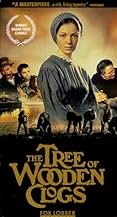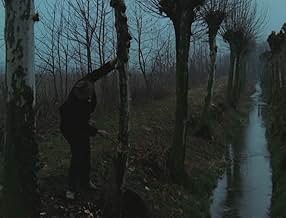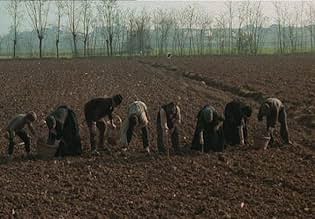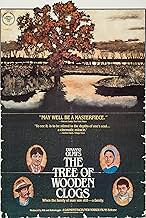La vita all'interno di una fattoria in Italia alla fine del XIX secolo. Molte famiglie povere vivono lì, e il proprietario le paga per la loro produttività.La vita all'interno di una fattoria in Italia alla fine del XIX secolo. Molte famiglie povere vivono lì, e il proprietario le paga per la loro produttività.La vita all'interno di una fattoria in Italia alla fine del XIX secolo. Molte famiglie povere vivono lì, e il proprietario le paga per la loro produttività.
- Regia
- Sceneggiatura
- Star
- Ha vinto 1 BAFTA Award
- 18 vittorie e 1 candidatura in totale
Trama
Lo sapevi?
- QuizAll the actors were real peasants from the Bergamo province, in Italy. They had no acting experience at all.
- BlooperWhen the children are making music with pots and pans, the 'instruments' of the little girl are switching from one hand to the other when the camera looks at her from the other side.
- Citazioni
[first lines]
Don Carlo: That boy should be going to school.
Batistì: Yes but six kilometers to school and six kilometers back seems a lot.
Don Carlo: He's young, he has strong legs.
Batistì: Just when we're about to have another baby. He could have started helping me around the house.
Don Carlo: He'll help you even more when he's older. Let providence provide for now.
Batistì: I grew up without ever seeing the inside of a school.
Don Carlo: That's not a good reason, and you know it. If God has given your boy a good mind, it's a sign he's expecting more of him. As the boy's father, it's your duty to do God's bidding.
- Curiosità sui creditiQuite strangely, the names of the actors are listed as "last name first name", while the names of the rest of the crew are correctly listed as "first name last name".
- Versioni alternativeThere are two versions of this movie: one which is spoken in the dialect of Bergamo, Italy, and one in which the actors dubbed themselves in Italian.
- ConnessioniEdited into Bellissimo: Immagini del cinema italiano (1985)
- Colonne sonoreIch steh' mit einem Fuß im Grabe BWV, 156
Composed by Johann Sebastian Bach
Performed by Fernando Germani
It is one of those films that is seemingly about nothing, but could be about everything. i didn't find its 3 hour length to be a problem. It is almost like watching a documentary about peasant life right down to its hand held camera techniques. It is subtle though. Not the shaky-cam or vomit-cam stuff you see today.
The cast is entirely made up of non-actors. Real peasants. And apparently it was shot using its local dialect, Bergamasque which then had to be dubbed into Italian for the Italian market. Olmi explains in the DVD extras that all of the non-actors did their own dubbing which I have to say is quite a technical accomplishment for amateurs.
The film opens with a farmer chopping the head off of a goose. A little later on the controversial scene depicting the slaughter and butchering of a hog is played out in almost real time. It is very graphic and quite disturbing. But just when I thought you would never want your kids to see this, Olmi cuts to two three year-old peasant kids watching the hog die with unbothered fascination. This is real life on a real farm.
And you can tell that it is done by a proficient butcher and is not a gratuitous add-on for exploitation. It is just something that Olmi has selected to include in the film.
I'd suggest this one for a change of pace.
I più visti
- How long is The Tree of Wooden Clogs?Powered by Alexa
Dettagli
- Data di uscita
- Paese di origine
- Lingua
- Celebre anche come
- The Tree of Wooden Clogs
- Luoghi delle riprese
- Aziende produttrici
- Vedi altri crediti dell’azienda su IMDbPro
Botteghino
- Lordo in tutto il mondo
- 9.367 USD
- Tempo di esecuzione3 ore 6 minuti
- Mix di suoni
- Proporzioni
- 1.33 : 1
Contribuisci a questa pagina



















